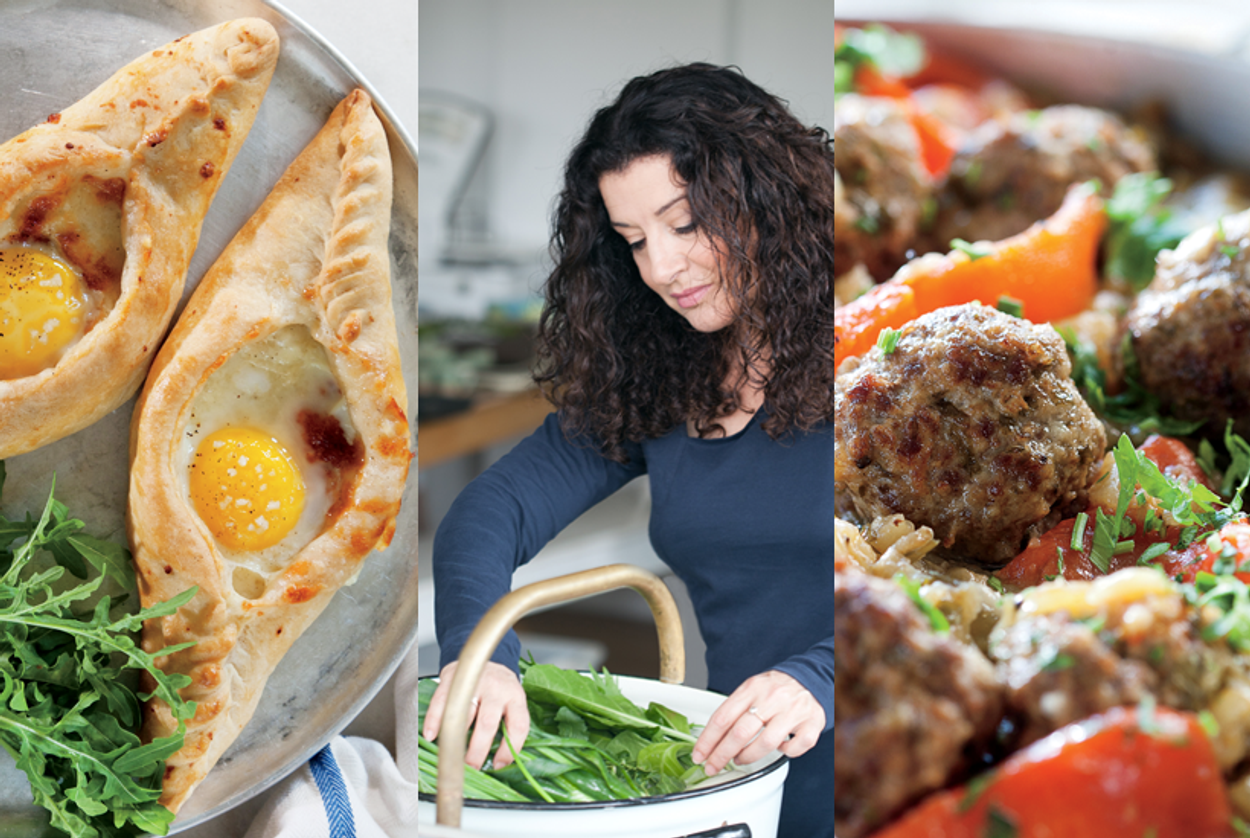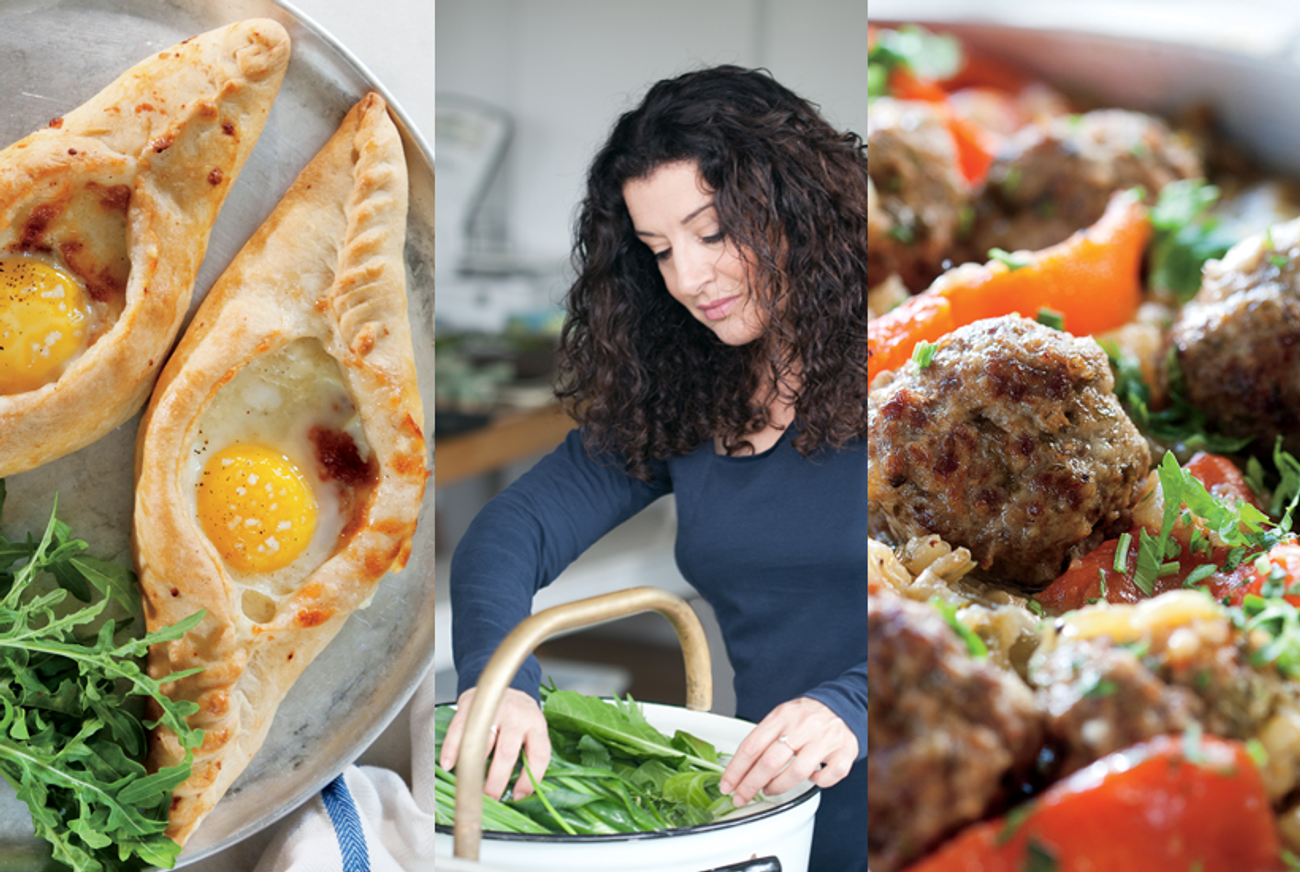A Taste of Hungary. And Morocco. And Iraq. And Bulgaria. And Libya.
Israeli culinary expert Janna Gur gathers traditional recipes from across the Diaspora in her new cookbook, ‘Jewish Soul Food’




As the editor-in-chief of the Israeli culinary magazine Al Hashulchan since its inception in 1991, and the author of the 2008 cookbook The Book of New Israeli Food, Janna Gur is Israel’s unofficial culinary ambassador to the world. “Gur is one of the people who influenced Israeli culinary art and advanced it the most,” Gerda Glezer, editor of Walla!Food, told me. But in her new cookbook, Jewish Soul Food: From Minsk to Marrakesh, Gur shifts her focus from modern Israeli cooking to the traditional Jewish cooking in the Diaspora that preceded it.
“I was so involved in celebrating our brave new culinary world that I regarded Jewish cuisines as a means to an end—a playing field for Israeli chefs, fertile ground on which the nascent Israeli cuisine could thrive,” Gur writes in her new book. Now, she looks back at the world of Jewish cooking as an end in itself, including more than 100 recipes from places as diverse as Hungary, Algeria, Georgia, and Iraq.
“When discussing Israeli food, you have to discuss ethnic food,” Janna Gur told me recently in the Tel Aviv offices of Al Hashulchan. “Jewish cuisines were the basis that Israeli food grows upon. Jewish food is the inspiration behind Israeli food, the treasure from which we birth a new cuisine, which is in fact made up of Jewish ethnic cuisines as well as local—Arab and Palestinian—cooking. At some point I started understanding that Jewish cuisine is an interesting and important thing in itself, and more importantly, that it is in danger of extinction.”
As longstanding Jewish communities around the world shrink or disappear altogether, their culinary traditions are at risk of dying out as well. Israel, Gur said, is “the only place that all these different styles of cooking still exist.”
“Israel has become what I like to call a living laboratory of Jewish food,” Gur said. “There is a natural selection going on, in which various ethnic dishes, like shakshuka, chraime, or sabich are naturally extracted from their ethnic context and becoming mainstream Israeli food. This is a beautiful thing because it happens naturally and it happens to dishes that are tasty, simple, and relevant today. But this happens only to a small percentage of dishes. Most ethnic dishes are still unknown outside of their ethnic context, and since the first generation of immigrants is gradually dying out and the second generation isn’t cooking those dishes anymore, Jewish cuisines are in danger of extinction in Israel as well. It’s a race against time. I really don’t know what will happen to all these recipes and traditions in 50 years from now.”
Gur is well aware that recipes are easy to document but difficult to truly preserve. “If people won’t want to eat a certain dish then documentation won’t help—it will become merely folklore,” she said. “It’s obvious that we can’t save everything, but the idea behind this book is my belief that the only way to preserve a cuisine is to cook the food and to find as many people as possible who will want to eat it.”
Gur is currently on a month-long book tour in North America, including a stop this weekend at New York’s Museum of Jewish Heritage. Instead of talking about new Israeli cuisine, as she usually does, this time she will introduce American audiences to the many wonders of Jewish soul food. The recipes she shares in her book are not too complicated, ranging from Persian gondi nohodi (chickpea and chicken dumplings in turmeric-lime broth) to Bulgarian burekas to American barbecued brisket. “Soul food is obviously a very amorphous definition—your soul food is not my soul food. But having said that, these recipes are home cooking, which is always something that is more soulful.”
Many people hear the term “Jewish food” and think it means Ashkenazi; Gur explained that despite the Holocaust, Ashkenazi food has survived because of its enduring popularity in the United States. But despite her own background—she was born in Riga and made aliyah as a teenager with her family—Gur seems to prefer different corners of the Jewish culinary world and filled the book with dishes like kubaneh (a Yemenite version of a brioche) or ushpalau (a hearty Bukharan pilaf). Jewish Soul Food contains many Iraqi, Syrian, North African, and Balkan recipes—much more than Ashkenazi ones. When I asked why, Gur smiled and said: “They have the best recipes.”
***
Gur didn’t always dream of becoming a food writer. She received her B.A. in English literature and Art History from the Hebrew University in Jerusalem and did her military service in the navy, teaching technical English to future naval officers, hoping to become a literary translator. While working on her M.A. in translation and literary theory at Tel Aviv University, she worked as a flight attendant for El Al; traveling the world, she fell in love with gastronomy. In the mid-1980s she met her future husband, journalist and independent publisher Ilan Gur, and in 1991, one month before the first Gulf War broke, the couple launched Al Hashulchan. “We started as a very modest, and almost embarrassing, trade journal,” she said. “After two or three years we found out that a lot of foodies and home cooks read the magazine—not only professionals—and we happily made the change from being a trade journal to being a real food magazine. The 1990s were the formative years of the Israeli culinary scene. Israel’s culinary revolution happened right in front of our eyes, and we were there to document it all.” As she writes about that era in the new book: “Peace was in the air, the economy was flourishing, and after decades of austerity, Israelis finally felt entitled to embrace the pleasures of good food.”
Today, almost a quarter of a century later, she sees the effects this revolution has had: “I see the way my kids and their friends regard food,” she told me. “Things that were revolutionary for us, like sourdough bread or boutique cheeses, they grew up with all that. Their palate is much more refined, and the nice thing is that they don’t make a big deal out of it, it just comes naturally to them.”
Despite spending decades focusing on modern Israeli cuisine, Gur says her own soul still yearns for the food she grew up with. “Both my grandmothers cooked excellent Ashkenazi food,” she said, “and both are represented in the book, which contains Savta Rosa’s Bessarabian eggplant salad and Savta Vera’s apple cake.”
That kind of deep, personal connection to food is what she hopes her new book will tap into. “I sent the PDF of the book to my friend Bonnie Stern, who is a Canadian food writer, and she told me she made Vera’s apfel kuchen. When her husband tasted it he said, ‘That’s my mother’s apple cake!’ ” Gur said. “Bonnie has been trying to recreate her husband’s mother’s apple cake for years! The cake is very different from American apple cake, it doesn’t resemble a pie. It’s dough comes out kind of soggy so the first time she made it she was sure she did something wrong and he told her, ‘No, that’s exactly how it’s supposed to be! That’s the cake!’ So, that was very moving for me.”
Gur also told me about sharing recipes with a recent dinner guest who was half-Syrian: “She told me about the food her grandmother used to make, so I showed her pictures of Syrian dishes from the book and she almost cried,” said Gur. “If you don’t have a Syrian background those dishes won’t make you cry, but they are still worth trying out. Every Jew will probably find dishes that connect them to their childhood or to their roots in this book, but I also hope that people are going to be willing to cross borders and try new things and in this respect behave like Israelis do.”
***
Like this article? Sign up for our Daily Digest to get Tablet Magazine’s new content in your inbox each morning.
Dana Kessler has written for Maariv, Haaretz, Yediot Aharonot, and other Israeli publications. She is based in Tel Aviv.
Dana Kessler has written for Maariv, Haaretz, Yediot Aharonot, and other Israeli publications. She is based in Tel Aviv.